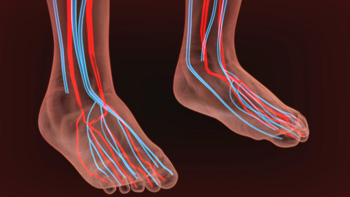
Patients who have poor circulation may notice their feet are cold, regardless of the temperature in the room. Additionally, having swollen feet may also be a sign of poor circulation. This may be a result of reduced blood flow, possibly causing the kidneys to function improperly. People who are constantly tired may have poor circulation, which can come from a lack of oxygen and nutrients. A weakened immune system and poor circulation may be linked together, possibly improving with regular exercise. Poor circulation can cause the scalp to become dry, and may lead to a gradual loss of hair. Patients who are afflicted with this condition may notice their nails are affected, as they can become fragile and break easier. If you have the above symptoms and your feet are affected, it is suggested that you confer with a podiatrist who can properly diagnose and treat poor circulation.
Poor circulation is a serious condition and needs immediate medical attention. If you have any concerns with poor circulation in your feet contact Carrie Frame, DPM of West Virginia Foot & Ankle. Our doctor will treat your foot and ankle needs.
Poor Circulation in the Feet
Poor blood circulation in the feet and legs is can be caused by peripheral artery disease (PAD), which is the result of a buildup of plaque in the arteries.
Plaque buildup or atherosclerosis results from excess calcium and cholesterol in the bloodstream. This can restrict the amount of blood which can flow through the arteries. Poor blood circulation in the feet and legs are sometimes caused by inflammation in the blood vessels, known as vasculitis.
Causes
Lack of oxygen and oxygen from poor blood circulation restricts muscle growth and development. It can also cause:
- Muscle pain, stiffness, or weakness
- Numbness or cramping in the legs
- Skin discoloration
- Slower nail & hair growth
- Erectile dysfunction
Those who have diabetes or smoke are at greatest risk for poor circulation, as are those who are over 50. If you have poor circulation in the feet and legs it may be caused by PAD and is important to make changes to your lifestyle in order to reduce risk of getting a heart attack or stroke. Exercise and maintaining a healthy lifestyle will dramatically improve conditions.
As always, see a podiatrist as he or she will assist in finding a regimen that suits you. A podiatrist can also prescribe you any needed medication.
If you have any questions please feel free to contact our office located in Charleston, WV . We offer the newest diagnostic and treatment technologies for all your foot and ankle needs.
